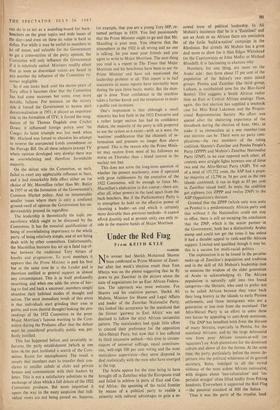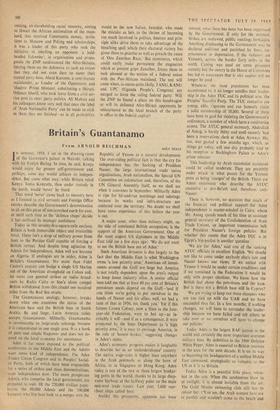Under the Red Flag
From KEITH KYLE
NAIROBI
No sooner had Sheikh Mohamed Shamte been confirmed as Prime Minister of Zanzi- bar after last week's 'election result than Tom Mboya was on the phone suggesting that he fly down to put Zanzibar in the picture about the state of negotiations for an East African Federa- tion. The approach was most welcome. For Shamte and his coalition partner, Sheikh Ali Muhsin, Minister for Home and Legal Affairs and leader of the Zanzibar Nationalist Party, this looked like acceptance by the mainland that the former 'gateway to East Africa' was not destined to follow the strict African nationalist pattern. The mainlanders had made little effort to conceal their preference for the opposition Afro-Shirazi Party, but now that it has suffered its third successive setback—this time in circum- stances of universal suffrage, equal constituen- cies, well-nigh 100 per cent voting and the most meticulous supervision—they seem disposed to deal realistically with the men who have emerged at the top.
The Arabs appear for the time being to have brought off in Zanzibar what the Europeans tried and failed to achieve in parts of East and Cen- tral Africa: the spanning of the racial frontier by means of a political party to enable a minority with cultural advantages to gain a re- newed lease of political leadership. In All Muhsin's insistence that he is a 'Zanzibari' and not an Arab or an African there are reminders of the futile 'build-a-nation' campaign in the Rhodesias. But already Ali Muhsin has a great deal more to show for it than Edgar Whitehead (or the Capricornists or John Moffat or Michael Blundell). It is fascinating to examine why.
Numbers, for one thing, are more on the Arabs' side: they form about 17 per cent of the population of the Sultan's two main island groups. Pemba and Zanzibar (the third group, Latham, is uninhabited save for the Blue-faced Booby) This suggests a South African rather than an East or Central African analogy. Then, again, this last election has supplied a textbook case fur Miss Enid Lakeman and the Propor- tional Representation Society. No effort was spared after the shattering experience of the bloodbath during the election of June, 1961, to make it as immaculate as a one member/one seat election can be. There were no party com- plications—the two members of the ruling coalition, Shamte's Zanzibar and Pemba People's Party (ZPPP) and Muhsin's Zanzibar Nationalist Party (ZNP), in no case opposed each other; all contests were straight fights between one of these two and the Afro-Shirazi Party (ASP). Yet out of a total of 157,772 votes, the ASP had a popu- lar majority of 12,790 or 54 per cent in the two islands combined; it ran as high as 63 per cent in Zanzibar island itself. In seats, the coalition got eighteen (six ZPPP and twelve ZNP) to the ASP Opposition's thirteen.
Granted that the ZPPP (which only won seats on Pemba) is a predominantly African party and that without it the Nationalists could not stay in office. there is still no escaping the conclusion that the ZNP, which is the senior partner in the Government. both has a distinctively Arabic stamp and could not get the votes it has unless it had a durable appeal to rank-and-file African support. Limited and qualified though it may be, this is a success for multi-racial politics The explanation is to be found in the peculiar make-up of Zanzibar's population and tradition and in the skill of Ali Muhsin's leadership (not to mention the wisdom of the older generation of Arabs in acknowledging it). The African
population is naturally split into two broad categories—the Shirazis, who used to prefer not to be called African because they trace back their long history in the islands to early Persian
settlements, and those immigrants who are a generation or less over from the mainland The Afro-Shi'razi Party is an effort to unite these two forces by appealing to anti-Arab sentiment. The ZNP has benefited both from the distaste of many Shirazis, especially in Pemba, for the
mainland Africans, and by the large deferential vote from poor African tenants-at-will (or 'squatters') on Arab plantations for the dominant culture and above all for the throne. At the same
time, the party, particularly before the recent de- parture into the political wilderness of its general secretary, Babu, indulged in all the verbal violence of the most ardent African nationalist, with slogans about 'neo-colonialism' and 'im- perialist stooges' often lifted bodily from Peking handouts. Everywhere it supported the Red Flag —the personal standard of HH the Sultan. Thus it was the party of the royalist, land- owning. ex-slaveholding racial minority, aiming to thwart the African nationalism of the main- land, that received Communist money, invita- tions to Moscow and Peking and scholarships; it was a leader of this party who took the initiative in labelling an opponent 'a bald- headed Tshombe'; in organisation and propa- ganda the ZNP outdistanced the Afro-Shirazis, forcing them on the defensive to such an extent that they, did not even dare to name their trusted party boss. Abeid Karume, a semi-literate mainlander, as Leader of the Opposition and `shadow Prime Minister, substituting a Shirazi, Othman Sharif, who took leave from a civil ser- vice post to enter party politics. Ali Muhsin and his colleagues know very well that once the label of 'Arab Nationalist Party' can be made to stick on them they are finished— as in all probability would be the new Sultan, Jamshid, who made the mistake as heir to the throne of becoming too much involved in politics. Interest and prin- ciple alike drive them to take advantage of the breathing spell which their electoral victory has given them to practise as well as preach the cause of `One Zanzibar Race,' But economics, which could easily make permanent the stagnation which at present grips Zanzibar, forces them to look pleased at the notion of a federal union with the Pan-African mainland. The test will conic when. as seems quite likely, TANU, KANU and UPC (Uganda People's Congress) are merged to form the ruling federal party. Will the ZNP be found a place on this bandwagon or will its defeated Afro-Shirazi oppOnents be reincarnated as the local branch of the party in office in the federal capital?







































 Previous page
Previous page